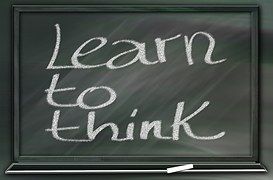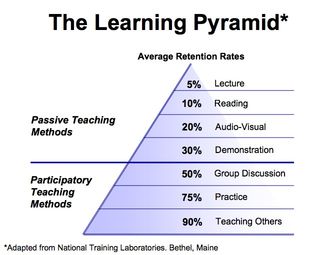
If only we could jack in our brains and download new knowledge and skills the way the Matrix films depict. But learning—whether
historical facts, musical mastery, or athletic aptitude—takes effort and time. The long duration of childhood is surely evidence enough of that. So sorry, would–be Einsteins, there are no shortcuts.
But if accelerated learning is the stuff of myth and science fiction, then are there any tricks that actually can help us master new material? There are, and here are four of them.
Repetition is important whether it involves textbook study, mentally going over your notes, or physically perfecting your tennis swing. But it’s not as important as you think. You may have heard Malcolm Gladwell’s claim that it takes 10,000 hours of practice to master a given skill
[1]. That’s the equivalent of 90 minutes a day for twenty years, an extraordinary burden of time that makes Gladwell’s simplistic popularization suspect.
Professor Anders Ericsson at Florida State University, on whose work Gladwell based his claim, actually stressed that it was the quality of practice that mattered rather than its quantity
[2]. Repetition and rote drills have their place but are hardly the whole story.
Attention matters more than people assume, and what matters most is how you focus and deploy it. You’ll retain less by listening to a lecture or watching a demonstration than if you actively take notes. And numerous studies have shown greater retention when you take handwritten notes than when you try to type what the teacher says verbatim. The latter is essentially transcription, a passive mode of cognition qualitatively different from attentive listening.

Rough retention rates from various forms of
learning. We traditionally rely on low–yield methods at the expense of
group study and feedback methods such as flashcards, practice out loud
or in front of a mirror, or explaining it to a friend. As Einstein said,
“If you can’t explain it to a six–year–old, you don’t understand it
yourself.”
Source: National Training Laboratories, Bethel Maine
An earlier column called “Sleep: The Clean–Up Crew of a Dirty Mind” explained how sleep reinforces long term learning
[3]. Memory consolidation especially takes place during stages III and IV of slow–wave sleep. Here our brainwave frequencies shift down from the alpha rhythm of wakefulness (10–14/sec) to the slower theta (4–6/sec) and delta range (2–3/sec)
[4]. These deepest and most restorative sleep stages occur only during the early part of the evening, which is why I tell students to go to bed early and get 7 to 8 hours. They actually undermine themselves by staying up late to cram. Far better to set an alarm and get up an hour early to study.
You’ve heard the term “muscle memory” used to describe how a once–difficult skill becomes second nature, as if physical repetition is the key. We struggle at first to master a musical piece, for example, but then conscious control increasingly drops out until we’re no longer playing individual notes but the overall piece. This is how style and artistry emerge. But the learning is not in your muscles—it’s in your head.
Appropriately timed exercise does appear to boost long–term learning by releasing modulatory chemicals without which newly encoded memories quickly decay. As reported in Current Biology, exercise performed 4 hours after a learning task, but not immediately after, improved the retention of picture–location associations. The improvement correlated with enhanced neural firing in the hippocampus, suggesting that well–timed exercise could be an effective intervention for learners of all kinds
[5].
Keep repetition, attention, sleep, and exercise in mind. And remember that successful long–term learning depends not only on the context in which you encounter new material, but on what happens in the hours and days afterwards. My students can hit the school gym nearby or simply meander downtown. Washington, D.C. has splendid architecture and interesting public sculpture. But even the dullest–appearing location has enough to occupy you if you turn your attention to it.
The point is to turn it away from work. When you get the ruminating mind out of the way, learning will consolidate naturally.
***********************************
1. Gladwell, M., Outliers : the story of success. 1st ed. 2008, New York: Little, Brown and Co. 309 p.

No comments:
Post a Comment